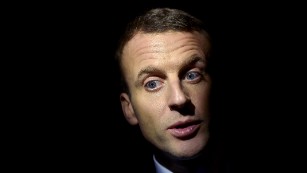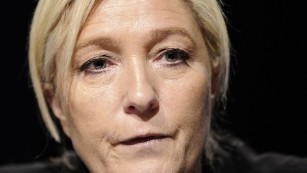Macron and Le Pen: How two outsiders defeated France’s political elite
(CNN)A political novice who has never before stood for elected office is facing off against a far-right nationalist from the fringes of French politics — it’s safe to say France’s presidential election is one for the history books.
Voters collectively turned up their noses at the political establishment Sunday, in the first round of the French presidential election. With 97% of polling stations declared, the stage is set for a run-off vote between Emmanuel Macron and Marine Le Pen on May 7.
Even third place was a close race between another outsider — left-wing firebrand Jean-Luc Mélenchon — and scandal-hit Republican Francois Fillon, the sole frontrunner representing a mainstream French party.
How did we get here?
Rewind five years. In the final round of the last presidential election, Socialist François Hollande beat incumbent Nicolas Sarkozy of the Union for a Popular Movement (now known as the Republicans).
French election: Related content
- Le Pen faces Macron in final round
- Why Putin and Trump both like Le Pen
The two parties have dominated French politics since the 1980s — similar to the grip Republicans and Democrats have on the US — though in France, the main parties are often supported by minor coalition partners.
With only one term under his belt, Hollande might have been expected to run again this year, but beset by personal scandals and plunging popularity rates, he moved aside, the first time an incumbent has not sought re-election since 1958.
Benoit Hamon, chosen by the Socialists to replace Hollande, struggled to get out of his predecessor’s shadow, cinching only around 6.3% of the vote in Sunday’s election.
The collapse of the mainstream left-wing vote should have benefited the Republicans, but they too struggled.
First to fall was Sarkozy, whose attempted return to French politics ended in humiliating defeat and third place in a Republican primary.
The winner of that race, Fillon, looked a sure bet for the presidency, until allegations emerged that he paid his wife and children for work they did not do. He denies any wrongdoing but it damaged his image as a scandal-free politician, and, with 97% of polling stations declared, he was neck-and-neck for third place with Mélenchon.
How did they do it?
Emmanuel Macron emerged from the twin wrecks of France’s two establishment parties.
The 39-year-old investment banker and former government minister‘s self-created party “En Marche!” quickly attracted hundreds of thousands of members and surged in the polls.
He promised reform of France’s welfare and pensions systems, business-friendly policies, and increased defense spending.
The weakness of the soft-left and soft-right seemed to create the ideal circumstance for a centrist like Macron, who appealed to both Fillon voters and right-leaning Socialists.
The favorite going into Sunday’s vote, Macron faced challenges from both his right and left, but Mélenchon’s dramatic surge in the last weeks of the campaign came just too late to knock the marchers off course.
The value of the euro jumped Monday after polls that favored Macron in the first round of the vote seemed to be proven correct — unlike those in the Brexit vote or the US presidential election.
Macron is a strong supporter of the EU, unlike his rival.
Marine Le Pen will face Macron in the runoff on May 7. The leader of the far-right National Front has shifted the racist, anti-Semitic party founded by her father Jean-Marie Le Pen closer to the mainstream and put herself within grasping reach of the presidency.
A former member of the French and European parliaments, Le Pen, despite coming from the fringes of French politics, was one of the most recognizable figures in this campaign of outsiders, and she dominated headlines at home and abroad.
Anti-immigrant, economically conservative and a supporter of pulling France out of both the European Union and NATO, Le Pen’s election would be a dramatic break from tradition for French politics.
Her chances have been buoyed by concerns over terrorism and the ongoing refugee crisis, both of which have seen support for anti-immigration policies rise.
What are their chances?
Despite her strong showing in the first round of voting, Le Pen will face a much greater hurdle if she is to fend off the challenge from Macron, around whom mainstream political support is already coalescing.
Hamon urged Socialist voters to back the novice “even if he is not left wing,” as has incumbent Prime Minister Bernard Cazeneuve. Speaking after Sunday’s vote, Fillon said the National Front “has a history known for its violence and intolerance. It’s economic and social program will lead our country to failure.”
EU leaders are also likely to back Macron, at least in private, as they hope to avoid another Brexit-like event.
The last time the National Front came this close to the presidency — in 2002 when Jean-Marie Le Pen made the runoff vote — voters across the political spectrum turned out to defeat the far right.
Jacques Chirac crushed Le Pen with more than 82% of the vote, the biggest landslide ever in a French presidential vote, amid a huge turnout where only 20% of registered voters stayed home.
Dominic Thomas, chair of the department of French and Francophone studies at UCLA, said while Le Pen “improved her constituency” significantly, more than 73% of voters in Sunday’s first round chose a candidate other than the National Front leader.
“That is a pretty solid indication of the way people are going to respond to (Sunday’s vote), by not tolerating someone like Marine Le Pen,” he said.







